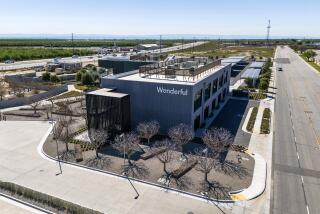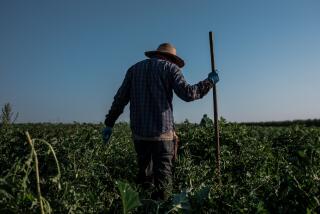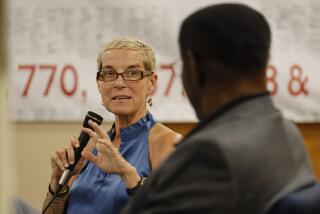Five years later, ballots show fruit workers rejected the UFW
More than 2,000 workers whose ballots were impounded five years ago saw the results of their vote Tuesday — an ouster of the United Farm Workers as their representative at Gerawan Farming, the state’s largest grower of peaches and other stone fruits.
A preliminary tally showed 1,098 workers voted against the union founded by Cesar Chavez, while 197 supported the UFW, said Jesse Rojas, a spokesman for Pick Justice, the worker group that fought for three years to have the ballots opened.
The count has not been officially validated by the state Agricultural Labor Relations Board, which will rule on 635 disputed ballots — not enough to change the outcome — and weigh whether owner Dan Gerawan unduly influenced the election process.
The board has declared the process tainted several times, but a state appeals court judge in May said he found that some of the charges were not supported by the evidence. He ordered the board to count the votes and to reevaluate its finding.
Last week, the state’s highest court refused to review the case, leading to Tuesday’s count.
Workers with the Pick Justice campaign who had gathered since the early morning hours erupted in tearful celebration after the results of the five-hour tally were announced at the Fresno facility where the ballot box was opened. “They’re thrilled,” Rojas said. “It’s an overwhelming victory.”
Anthony Raimondo, an attorney for the group, said the state labor board will have to prove that any influence on workers by Gerawan directly affected the outcome.
“It’s going to be difficult, if not impossible, for them to meet the burden to show that the things they said happened affected the way workers voted,” Raimondo said.
UFW spokesman Armando Elenes, who confirmed the tally, called the vote a “mockery of justice.”
“They always wanted everyone to focus on the vote count because they didn’t want anyone to pay attention to how they got there in the first place,” he said.
Gerawan said he was “extremely proud” of his employees. “They fought for the same basic right to choose that all workers in the state enjoy. I’m immensely proud of them.” He added that the overwhelming margin constituted a “complete repudiation” of the Agricultural Labor Relations Board.
Regardless, the vote result is a major milestone in decades of fighting between the UFW and Gerawan, marked by skirmishes in multiple courts.
The decertification campaign against the UFW, which began in 2013, was the largest labor activity on California farms in decades. The anti-UFW drive was an irony for the union, which Cesar Chavez founded in the 1960s to organize and protect a largely unrepresented farm labor force.
The roughly 3,000 workers who would be covered by a UFW contract at Gerawan’s Reedley facility balked at having to pay dues to a union that had been chosen more than two decades prior — and had all but disappeared from the farm until 2012, a decade after the state passed a mandatory mediation law that allowed a mediator to impose a contract.
The UFW first organized Gerawan workers in the early 1990s and was certified as their collective bargaining representative in 1992. Contract negotiations stalled for several years, after which the union shifted its focus to legal remedies in Sacramento.
Gerawan contends that the union abandoned workers for more than 17 years. UFW contends it made several contract proposals that were rebuffed.
The union eventually obtained a contract under the mandatory mediation law, which Gerawan unsuccessfully argued was unconstitutional. The contract remains under dispute and has not been implemented.
It took six months of hearings that produced 20,000 pages of testimony from 130 witnesses to win the right to decide whether to keep the UFW as their representative. But the Agricultural Labor Relations Board impounded those ballots shortly after the November 2013 vote amid charges that the election was unduly influenced by Gerawan.
The Agricultural Labor Relations Board will have several weeks to certify the results before taking up the broader issue of the fairness of the election.
Twitter: @LATgeoffmohan
UPDATES:
Sept. 20, 4:25 p.m.: This article was updated to clarify the status of the United Farm Workers contract at Gerawan Farming.
Sept. 18, 4:30 p.m.: This article was updated with comments and details from Pick Justice and the United Farm Workers.
Sept. 18, 11:30 a.m.: This article was updated with comments from Pick Justice spokesman Jesse Rojas and with details of the ballot count process.
This article was originally published on Sept. 18 at 10:50 a.m.
More to Read
Inside the business of entertainment
The Wide Shot brings you news, analysis and insights on everything from streaming wars to production — and what it all means for the future.
You may occasionally receive promotional content from the Los Angeles Times.











